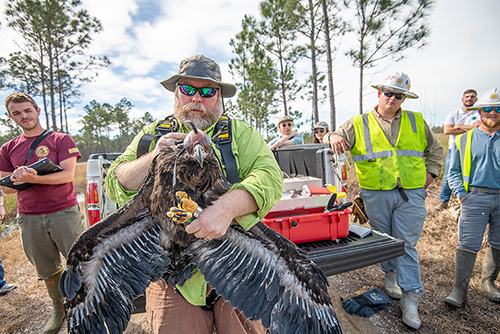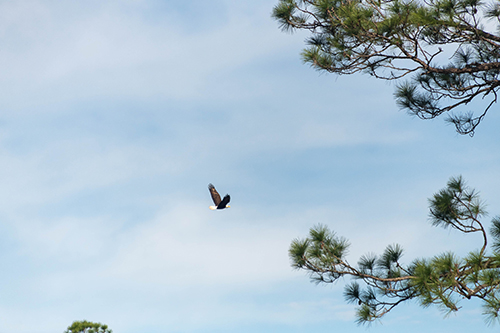Bird’s-eye view: Banding bald eagles on the coast for conservation research
Contact: Meg Henderson
STARKVILLE, Miss.—On a clear spring morning along the Mississippi coast, Scott Rush, a scientist in Mississippi State University’s Forest and Wildlife Research Center, ascends over an open savannah in a specialized utility bucket truck designed to climb nearly 10 stories high. When he nears the top of the towering pine tree, where a sizable eagle’s nest rests securely in a forked branch, Rush extends a dip net and carefully scoops up one eaglet, then the next, while an adult parent eagle circles anxiously overhead.

His work is part of a conservation and environmental stewardship effort, studying the health of the formerly endangered birds that also give indicators of the broader environmental health of their ecosystem. The multi-institutional coastal partnership began when Rush was tracking eagles in the Noxubee Wildlife Refuge and wanted to replicate his work in the Mississippi Sandhill Crane Wildlife Refuge in Jackson County.
This is the sixth spring that Rush, an associate professor in MSU’s Department of Wildlife, Fisheries and Aquaculture, has traveled to the coast to band and track young bald eagles on the verge of fledging, or taking flight. For the past three years, he has returned to the same nest to find a new pair of eaglets waiting to get strong enough to spread their wings and soar.

“I reached out to refuge biologist Scott Hurford, who readily approved the project and gave us the support of the U.S. Fish and Wildlife Service,” he said. “And Mississippi Power was willing to support us with a crew and a utility truck.”
Michael Harvey, director of environmental affairs at Mississippi Power, has strongly supported Rush’s research from the beginning. The utility company, which serves nearly 200,000 customers in 23 of Mississippi’s southeastern counties, is invested in helping facilitate the project and learning about the eagles and their flight patterns.
“When it comes to investing in our communities, environmental stewardship is one of our key priorities,” he said. “Partnering with Mississippi State helps us promote conservation, but we’re also interested in the science. Our department has a biologist and an avian program—when we do transmission projects, we look at the layout of the terrain and consider all wildlife, including the flight paths of migratory birds.”
Once the eaglets are brought safely to the ground, Rush attaches identification bands around their ankles. He also fits each bird with a GPS transmitter—a device that looks like a small backpack, with the straps secured around the bird’s body yet allowing plenty of mobility for flight. The transmitters, which typically run for a year or more, are powered by solar-charged batteries and capture location data every hour.
“The GPS trackers relay information, such as location, altitude, speed and air temperature, through cell towers,” he said. “We are able to track the young birds as they migrate safely along the Appalachian Trail into New England or Canada.”
In addition to banding the birds, Rush gives them a brief physical exam—recording weight and wingspan, and taking a small blood sample to determine their sex and identify any lead concentrations that may be present.
“We want to make sure that conditions on the refuge are good and that the birds are healthy and strong,” he said. “Because they travel widely and eat broadly across the food chain, eagles are an indicator species of the health of their environment, so we can monitor the system as well as the birds.”
Rush hopes to continue his coastal partnership, keeping an eye on the environment through the young eagles’ health and flight behavior.
“Fifty years ago, eagles were considered endangered, but we’ve had a lot of success bringing them back through strong conservation efforts over the years,” Rush said. “As eagles now have a greater presence in our cities and neighborhoods as well as parks and refuges, I think that this is a very important project, and I’d like to keep it going as long as we can.”
To learn more about the Forest and Wildlife Research Center at Mississippi State, visit fwrc.msstate.edu.
Mississippi State University is taking care of what matters. Learn more at www.msstate.edu.